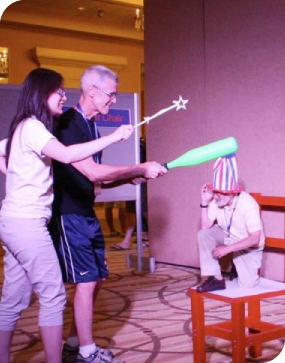The main aim of the Psychology Department’s annual PsyJourney is to awaken new interest in psychology, and to raise more awareness of a subject that many people know little about.
“In Hong Kong people tend to think there are only two kinds of psychology – clinical and educational,” said Dr Tseng Chia-huei, Assistant Professor in the Department of Psychology. “We want to show them there’s a lot more to it – cognitive psychology for example, is a very exciting subject.”
She feels that in other Asian countries there is more awareness. “In Japan, the field is seen as more diverse and commercial. Cognitive psychologists are recruited by advertising firms to advise on product marketing. They look into the psychological reasons why people buy one brand and not the other.”
This year’s PsyJourney was jointly organised by the Psychology Society, Psychology Department and the Faculty of Social Sciences. The theme was ‘Chronicles of the Mind’, and events ran from late March to mid-April. PsyJourney has always been open to the public, but in previous years has tended to be limited to people students know. This year the net was spread much wider via local media. “Places filled up within 24 hours, the response was overwhelming,” said Dr Tseng. “We got a wide cross-section of people, and all ages – 12 to 70.”
Part of the attraction was the fun theme of the events, particularly Mind Crypt, a challenge that combined psychological theories with the popular Room Escape game, whereby people have to escape a darkened room within a certain time limit by solving cryptic clues.
Dr Tseng explained the idea came about after she signed up to play the original Room Escape. “Three friends and I tried the game,” she said, ”and we failed to escape the room. So we signed up immediately for another session... and we failed again. And we’re thinking ‘come on, we are four PhDs – why can’t we do it?’ So I thought it would be good to include the game in PsyJourney as it’s all about perception.”
For Mind Crypt, students designed a room to look like an abandoned scientific laboratory circa 1940s. Teams of four to six people were locked in the room and given 45 minutes to escape by solving the clues. The room was pitch black, and music and sudden loud sounds were played at random moments. They had to decrypt confusing codes to unlock five boxes – the first one of which provided them with a small flashlight.

The relevance to every day life is that perception changes how we feel - whether we are happy or un happy, for instance, has a lot to do with perception.
Dr Tseng Chia-hueiAltering perception
The psychological point of the game is perception – put in unusual circumstances people’s perception alters, they have
difficulty judging the passage of time. The odd sounds are based on the principle of generalisation, associating them with elements of fear.
The game also tested the perception of ‘functional fixedness’ by which we have tendency to view and use objects in one particular way – in this case, the flashlight. The answer to the final clue was written on a piece of pape wrapped around the battery.
Only 10 per cent of the participants escaped, and the session was followed by a debrief given by students explaining the psychology used.
 In Mind Craft, participants explore the combination of distance and retinal size to create optical illusion pictures.
In Mind Craft, participants explore the combination of distance and retinal size to create optical illusion pictures.
The second event, Mind Craft, looked at optical illusions through a practical workshop on how such phenomena play with size and distance perception. Participants created their own optical illusions. “Optical illusions work because while your eyes do their job – they see – the brain tricks you into believing you are seeing something else,” said Dr Tseng.
“The relevance to every day life is that perception changes how we feel – whether we are happy or unhappy, for instance, has a lot to do with perception. The basic parameters of life are fairly simple, so if we can change perception we can help people deal with depression and learn how to make ourselves feel happier.”
Students benefited from PsyJourney as it made them use a variety of skills, from script-writing for the game, designing the room, building props and having a contingency plan in case anything went wrong. They also wrote and presented the debriefing sessions.
“In addition, they had interaction with the public,” said Dr Tseng, “which is important to make them realise we are not isolated academics, we have a role in the world. But equally, the main aim of the exercise was to teach the public about psychology. As the leading university in Hong Kong, it’s our responsibility to inform them, and to share our knowledge.”■


